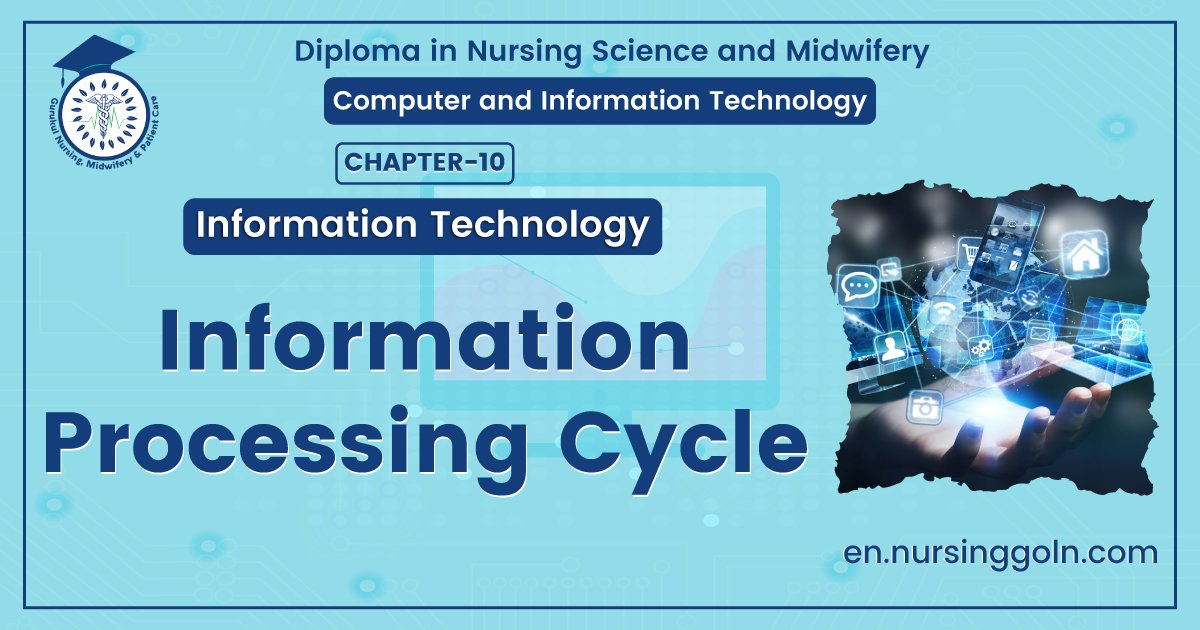Information Processing Cycle – This book covers the entire syllabus of “Computer & Information Technology” prescribed by the BNMC for B.Sc. in Nursing Science & Diploma in Nursing Science & Midwifery students. We tried to accommodate the latest information and topics.
This book is an examination setup according to the teachers’ lectures and examination questions. We hope in touch with the book students’ knowledge will be upgraded and flourished. The unique way of presentation may make your reading of the book a pleasurable experience.

Information Processing Cycle
Information processing cycle is a sequence of events consisting of input, processing, storage & output. These events are similar as in case of data processing cycle. In order for a computer to perform useful work, the computer has to receive instructions and data from the outside world.
Four phases of the Information Processing Cycle
1) Input: Computer receives data and instructions
2) Process: Computer applies instructions to data to produce information (organized Data)
3) Storage: Saving the information for subsequent use or use in future
4) Output: Computer sends information to people in a usable format.

The 21st Century and Information and Communication Technology
The concept of wealth prevailed in the last century has radically changed. The whole world rightly acknowledges that the wealth of the 21st century is knowledge. It means that neither agriculture, mineral resources and energy, nor industry and business are the sources of wealth as human beings are the only resources able to search for knowledge. This concept has reshaped the people’s way of thinking throughout the world. They have been taking preparation to face the challenges of the 21″ century.
We have already started realizing that the world of the 21 century is making its firm standing on a knowledge-based economy. In this century, two more important factors globalization and internationalization have come into being, and ICT is the main driving force behind their acceleration.
Now the geographical border of a country transcending own extends to all parts of the world as an effect of globalization. We can refer to Bangladesh as an example of making the point clear. Millions of Bangladeshis now live all over the world.
The place where they live in is as if a small Bangladesh. So, in one sense, the border of Bangladesh has extended beyond the line. Moreover, they, in spite of being the natives of Bangladesh, are living as the citizens of different countries. ‘Internationalism’ is the unwritten law of the present world.

Once people had to depend on the blessings of nature for survival. However, inventing machines and tools, they have lessened this dependence. With the help of machines and technology, they have controlled the world economy after the Industrial Revolution in the 18th and 19th Century.
The nations, who participated in the industrial revolution, once ruled the world. A similar shift of power has been observed, as the knowledge-based economy has started dominating the world in the 21st Century.
We can realize that we should take adequate preparation for taking part in this revolution. The specific skills for survival are the ability to cooperate and communication with each other, awareness about the obligations of citizenry, acumen in solving problems, critical thinking, creativity and skill in ICT.
In fact, skill in ICT has emerged as the most important technological skill. Everyone should have the basic computer literacy to survive in 2st century. Only then, one may have access to its amazing world. Unless students acquire the ICT skills, they may not generate new knowledge by collecting, analyzing, and evaluating information. In fact, without the skill, they can never face the challenge in the 21″ Century and position themselves in the knowledge based society.
Read more:
